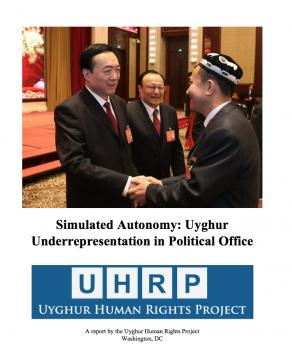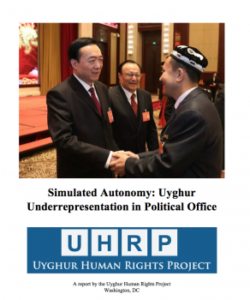Simulated Autonomy: Uyghur Underrepresentation in Political Office

Uyghur Human Rights Project, 30 October 2017
 UHRP – The 19th Party Congress in Beijing has focused attention on high politics in China and brought attention to the underrepresentation of minorities and women in the highest ranks of the Chinese government. A new report from the Uyghur Human Rights Project (UHRP) examines the demographics of political office holders in East Turkestan and finds significant underrepresentation of Uyghurs. Despite the fact that it is officially the “Xinjiang Uyghur Autonomous Region,” Han hold the majority of senior positions in the government and the Chinese Communist Party.
UHRP – The 19th Party Congress in Beijing has focused attention on high politics in China and brought attention to the underrepresentation of minorities and women in the highest ranks of the Chinese government. A new report from the Uyghur Human Rights Project (UHRP) examines the demographics of political office holders in East Turkestan and finds significant underrepresentation of Uyghurs. Despite the fact that it is officially the “Xinjiang Uyghur Autonomous Region,” Han hold the majority of senior positions in the government and the Chinese Communist Party.
UHRP believes that in the context of an ongoing crackdown targeting Uyghurs the promotion of Chen Quanguo to the Chinese Communist Party (CCP) Politburo will diminish Uyghur political, economic, social, and cultural rights. UHRP also believes his promotion will lessen Uyghur representation in political offices.
“The Uyghurs’ homeland is supposedly an autonomous region, Uyghurs are systematically excluded from government, particularly from offices that hold genuine power,” said Omer Kanat, UHRP’s director. “Uyghurs thus have little say in the policies that are implemented in the region and have good reason to feel like their voices are not being heard.”
The 81 regional positions documented show Han Chinese occupy 64% of senior posts and Uyghurs, the titular ethnicity of the Xinjiang Uyghur Autonomous Region, barely 20% of offices. At the prefectural scale, Uyghurs comprise 21% of the 28 Party Secretary and Governor positions. Han occupy 50% and other ethnicities 39%. At the county level, Uyghurs occupy 24% of Party Secretary and Mayor posts. Han occupy 51%, other ethnicities 15%, and 10% are vacant. Most pronounced was underrepresentation of Uyghurs in the military and party, which are the centers of power in the region. According to an analysis of the 2010 census by demographer Stanley Toops, in Xinjiang, “Uyghur account for 45.84%, Han 40.48%, Kazakh 6.50%, Hui 4.51% and the rest account for 2.67% [of the regional population].”
UHRP found the starkest demonstration of underrepresentation among women and in particular, Uyghur women. Eleven percent of Party Secretary and Mayor posts at the prefectural scale have female incumbents (4% of this number are Uyghur females). At the county level, the figure is 6% (1.5% of this number are Uyghur females). There are no Uyghur women Party Secretaries at county and prefectural scales. The situation for women in senior positions at the regional scale is dismal and for Uyghur women almost nonexistent. According to the 2013 figures from the Xinjiang Statistical Yearbook, there are approximately 11,450,000 women in East Turkestan, representing 48.7% of the total population.
Despite the fact that the Chinese Communist Party (CCP)_has made some efforts to cultivate a group of “elite” ethnic minority leaders in the region, distrust even of those Uyghurs in official positions is evident. Uyghurs in government must make their loyalty to the state clear, but this creates mistrust in the broader Uyghur community, undermining their usefulness as the Party’s representatives. Only a free and fair system for selecting Uyghur officials can ensure genuine and meaningful participation of Uyghurs in decision making.
The result of Han domination of the regional government is policies that are driven by Beijing’s directives and a repressive approach to the local population, who feel left out of the benefits of center-led economic development. Not only are Uyghurs marginalized inside government, the CCP allows no space for civil society to develop and permit Uyghurs outside of official life to participate in the direction of public policy. The government should allow Uyghurs the freedom to establish educational institutions, media outlets and non-government organizations and permit them to participate in monitoring and enforcing state performance. This would ensure the proper representation of vulnerable populations and create a more equitable distribution of the benefits of development.
International human rights standards as laid out in the Universal Declaration of Human Rights (UDHR), the International Covenant on Civil and Political Rights (ICCPR), the Convention on the Elimination of All Forms of Discrimination against Women (CEDAW), the International Convention on the Elimination of All Forms of Racial Discrimination (CERD), and the Declaration on the Rights of Persons Belonging to National or Ethnic, Religious and Linguistic Minorities require genuine and meaningful representation of women and minorities. The international community should push China to ratify the ICCPR and make efforts to encourage China to realize its obligations under CEDAW and CERD.
UHRP calls on the Chinese government to make efforts to increase the proportions of vulnerable populations, including women and ethnic minorities, in public life by removing barriers to their political participation. Doing so would help their avowed goal of bringing stability to the Uyghur region by creating a more open and fair society.
Simulated Autonomy: Uyghur Underrepresentation in Political Office can be downloaded at: http://uhrp.org/docs/political-representation-repor.pdf

